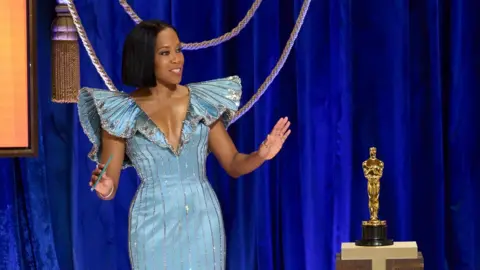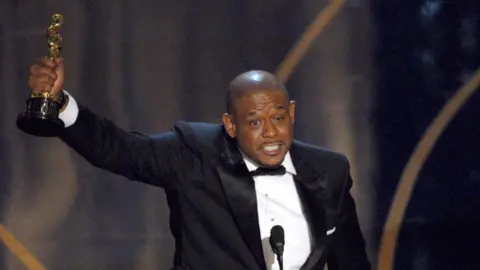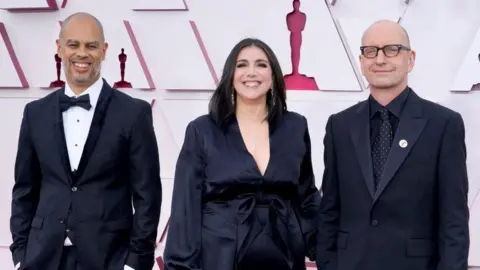Oscars 2021: Audiences turn away as a sluggish ceremony leaves critics cold
 Reuters
ReutersThe number of people watching the Oscars dropped to an all-time low on Sunday, overnight figures reveal.
Just 9.85 million US viewers tuned in to the ceremony, a drop of 58% from the previous low of 23.6 million in 2020.
Interest in the event was dealt a double blow by the lack of blockbuster contenders, and audience fatigue with drab Covid-era award ceremonies.
And despite historic wins for Anthony Hopkins, Chloé Zhao and Daniel Kaluuya, reviews were overwhelmingly negative.
TV Line deemed the event "a painfully earnest snoozefest", while IndieWire called it an "insiders' awards show [that] collapsed under its own weight".
The Arts Desk said it was "dispiriting throughout" and asked why winners were allowed "to yammer on incessantly".
Even Variety's more upbeat review took issue with its "insistence on upending its own order for the sake of it".
In a pandemic-necessitated break with tradition, this year's Oscars were moved from their usual home at Hollywood's Dolby Theater to Los Angeles's Union Station.
The Hollywood Reporter's Scott Feinberg felt it was a fitting location for the ceremony given "it was, in some ways, a trainwreck".
"Far too many decisions were badly miscalculated," he continued, lamenting the absence of a host, live music performances and the usual array of film clips.
"The ratings will be out tomorrow," he concluded. "My guess is they will not look pretty."
Other innovations this year included having the best actor and actress awards announced last, instead of best picture as is customary.
That resulted in an an awkward end to the ceremony - where an absent Sir Anthony Hopkins was named best actor for The Father, edging out the presumed favourite, the late Chadwick Boseman.
"Like most of the world, Sir Anthony was apparently not watching the Academy Awards," said Entertainment Weekly's critic of the show's "dull thud" of an ending.
IndieWire's Ben Travers, meanwhile, said it had resulted in a finale where "everyone [was] reminded that a black man rarely wins best actor".
Only four black performers have ever won the best actor Oscar, and the last to do so was Forest Whitaker in 2006.
 Getty Images
Getty ImagesSir Anthony's win made him the oldest recipient of the coveted award in an evening that was not short of record-breaking achievements.
Nomadland's Chloé Zhao became the first non-white woman to win best director, while Daniel Kaluuya became the first black British actor to ever win an Oscar.
Yet history was also made by supporting actress nominee Glenn Close, who again failed to take home an Oscar - a record-breaking eighth loss.
To add ignominy to injury, the veteran star was subsequently called upon to participate in a quiz that ended with her shaking her rear to 1988 funk hit Da Butt.
The Telegraph's Ed Power found the sequence "horribly toe-curling", describing it as "a slice of Ant and Dec-level goofing that was unforgivably indulgent".
Yet The Guardian felt it was actually one of the highlights of the night, praising the 74-year-old Close for generating "the meme of the evening".

More on the 2021 Oscars

Few parts of the ceremony escaped the critics' displeasure, with particular opprobrium reserved for the In Memoriam roll-call of the year's dearly departed.
The Arts Desk's Matt Wolf felt organisers "sped through [it] as if embarrassed", while Entertainment Weekly's Darren Franich found it "embarrassingly rushed".
Some Twitter users also complained, calling the segment "disrespectful" and the accompanying music - Stevie Wonder's As - inappropriately "peppy".
Others were outraged that Jessica Walter and Glee's Naya Rivera were omitted, even though their best-known work had mostly been on television.
According to the Telegraph's Ed Power, this year's ceremony was "a golden opportunity... to remind audiences of the magic of the movies".
"Instead it achieved the opposite," he concluded, describing the event as "at once bombastic and underwhelming [and] ploddingly earthbound".
TV Line's Dave Nemetz concurred, calling the ceremony "a sluggish, humourless mix of overly long speeches and endless pats on the back".
Yet this year's Oscars were not entirely without friends, with Deadline's Dominic Patten saluting what he saw as "a true Hollywood reinvigoration".
"There's a lot of things the Oscars weren't, but lacklustre thankfully wasn't one of them," he wrote in one of the evening's few positive write-ups.
Time magazine also had good things to say, decreeing that the "surprisingly decent" event was a marked improvement on February's "boring" Golden Globes.
 Reuters
ReutersThis year's Oscars - the 93rd - were co-produced by Steven Soderbergh, the Oscar-winning director of Traffic, with Jesse Collins and Stacey Sher.
When they were hired last December, the trio said they wanted a show that would "focus on the movies and the people who make them in a new way".
"I had opinions [on] how the Oscar shows have been presented in the past," Soderbergh told Vanity Fair earlier this year. "This was an opportunity to try some stuff."
He said he hoped the show would be "a love letter to people who make films" that would feel to viewers like a "three-hour movie in which some awards are given out".
The ratings are likely to cause concern at the Academy, which organises the show. But they are part of a downward trend for award shows in general.
Last year's Grammys pulled in 18.7 million viewers, while the Golden Globes attracted 18.3 million. This year, their audiences fell to 7.8 million and 6.9 million viewers, respectively - both bigger drops than the Oscars experienced.
Oscar ratings and best picture winners by year
- 2021: 9.85 million, Nomadland
- 2020: 23.6 million, Parasite
- 2019: 29.6 million, Green Book
- 2018: 26.5 million, The Shape of Water
- 2017: 32.9 million, Moonlight
- 2016: 34.4 million, Spotlight
- 2015: 37.3 million, Birdman
- 2014: 43.7 million, 12 Years A Slave
- 2013: 40.3 million, Argo
- 2012: 39.3 million, The Artist

Follow us on Facebook, or on Twitter @BBCNewsEnts. If you have a story suggestion email [email protected].
